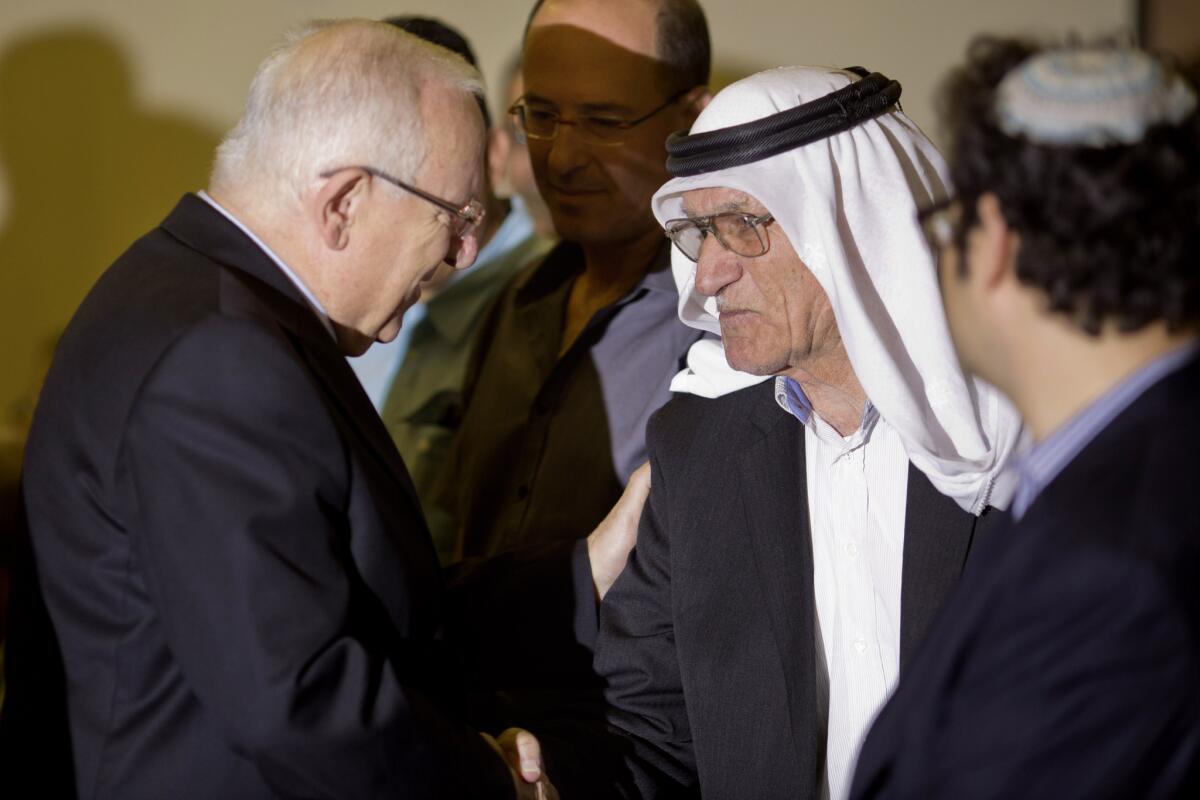Israeli president calls 1956 massacre of Arabs a ‘terrible crime’

- Share via
Reporting from Jerusalem — In a landmark gesture to the country’s Arab minority, Israeli President Reuven Rivlin visited the town of Kafr Qasim to pay tribute to victims killed by Israeli troops in an incident that remains a gaping wound for Israel’s Arab citizens nearly six decades later.
The first Israeli president to do so, Rivlin attended the annual memorial ceremony held for what has long been called the “Kafr Qasim massacre,” laying flowers at a monument engraved with the victims’ names.
“I have come here today as a member of the Jewish people and the president of the state of Israel to stand before you, the families of the slain and injured, to mourn and remember,” Rivlin said. “The brutal killing in Kafr Qasim is an anomalous and sorrowful chapter in the history of relations between Arabs and Jews living here,” said the president.
“The state of Israel has recognized the crime committed here. And rightly, and justly, has apologized for it,” said the president. “I too am here today to say a terrible crime was done here … the murder of innocents,” said Rivlin, who said future generations must be educated about the tragic events and the lessons that must be learned.
His predecessor Shimon Peres apologized during a 2007 visit to the town.
Like other Palestinian communities that became part of the state of Israel in 1948, Kafr Qasim was under military rule until 1966, with a nightly curfew starting at 9 p.m.
Fearing a surprise move by Jordan on the first day of the Sinai campaign in October 1956, Israel’s military moved up the curfew in eight communities near the border with Jordan to 5 p.m. but word was late in reaching local leaders and didn’t make it to villagers working the fields.
In seven villages, the matter was resolved peacefully. In Kafr Qasim, the results were tragic. Acting on a commander’s orders, troops shot dead dozens of civilians who unknowingly violated the curfew. As many as 49 people were killed, including women and children. Several soldiers disobeyed the orders and refused to shoot.
The prime minister at the time, David Ben-Gurion, used military censorship to hush up the bloodbath but two lawmakers used their parliamentary immunity to disclose it in a debate in Israel’s parliament, the Knesset, and the case was investigated and brought to court.
Two years later, eight commanders and soldiers were sentenced to jail for periods of between seven and 17 years. Coining a phrase that would become a guiding principle in military and legal doctrine, Judge Binyamin Halevy called the order an “expressly illegal command,” one marked with a “black flag” that soldiers must refuse to follow.
Despite the harshly worded ruling, those sentenced were pardoned after a year by the state’s president.
In his remarks Sunday, Rivlin did not confine his words to the past but also spoke of the troubled present, saying that Jews and Arabs are destined to live together, even if this is the choice of neither.
Israel is the “national home of the Jewish people, who returned to their land” but also will always be the homeland of its Arab citizens, who are “part and parcel of this land,” Rivlin said.
“I am not naive. There is no point in denying or ignoring the reality of relations between the communities,” Rivlin said. Still, despite what he called “difficult and deep-rooted hatred,” Rivlin said he believes it possible to establish trust between Arabs and Jews in Israel “for the simple reason that none of us … have any other choice.”
The affable Rivlin, a former lawmaker for decades, became Israel’s 10th president in July. Despite lifelong membership in right-wing parties and objection to a Palestinian state, Rivlin has emerged as a strong voice for civic equality and against racism in Israeli society.
Recently, he teamed up with 11-year-old George Amireh, a Christian Arab boy from Jaffa to make a joint video urging mutual tolerance and empathy, after seeing the boy’s own video protesting bullying peers that went viral.
The president also referred to continuing friction in Jerusalem and urged Arab citizens and leaders to take a strong stand against violence. “All that live here today must stand up and speak out against … those who try to plunge us into the abyss,” he said.
Jerusalem remains tense after a Palestinian motorist last week drove into a light-rail stop, fatally injuring a 3-month-old baby and a 20-year-old tourist from Ecuador, Karen Mosquera, who died of her wounds Sunday. Mosquera had been in Israel studying for her conversion to Judaism.
Large police and security forces were deployed in the city to counter unrest after the incident, which police have ruled a terrorist attack. The driver, Abdel Rahman Shaludi, was shot by a police officer on the scene and died of his wounds that evening.
Rocks were thrown during a procession held near Shaludi’s house in Jerusalem’s Silwan neighborhood to protest police restrictions on his funeral.
Separately Sunday evening, a crowd of thousands attended the burial of 14-year-old Orwa Hammad, a Palestinian American shot dead by Israeli forces in the West Bank on Friday.
The U.S. expressed condolences to the family and urged a swift and transparent investigation into the incident. Hammad was born in New Orleans and moved to the West Bank as a young boy. Israel’s military said the teen was poised to throw a firebomb.
Sobelman is a special correspondent.
More to Read
Sign up for Essential California
The most important California stories and recommendations in your inbox every morning.
You may occasionally receive promotional content from the Los Angeles Times.










